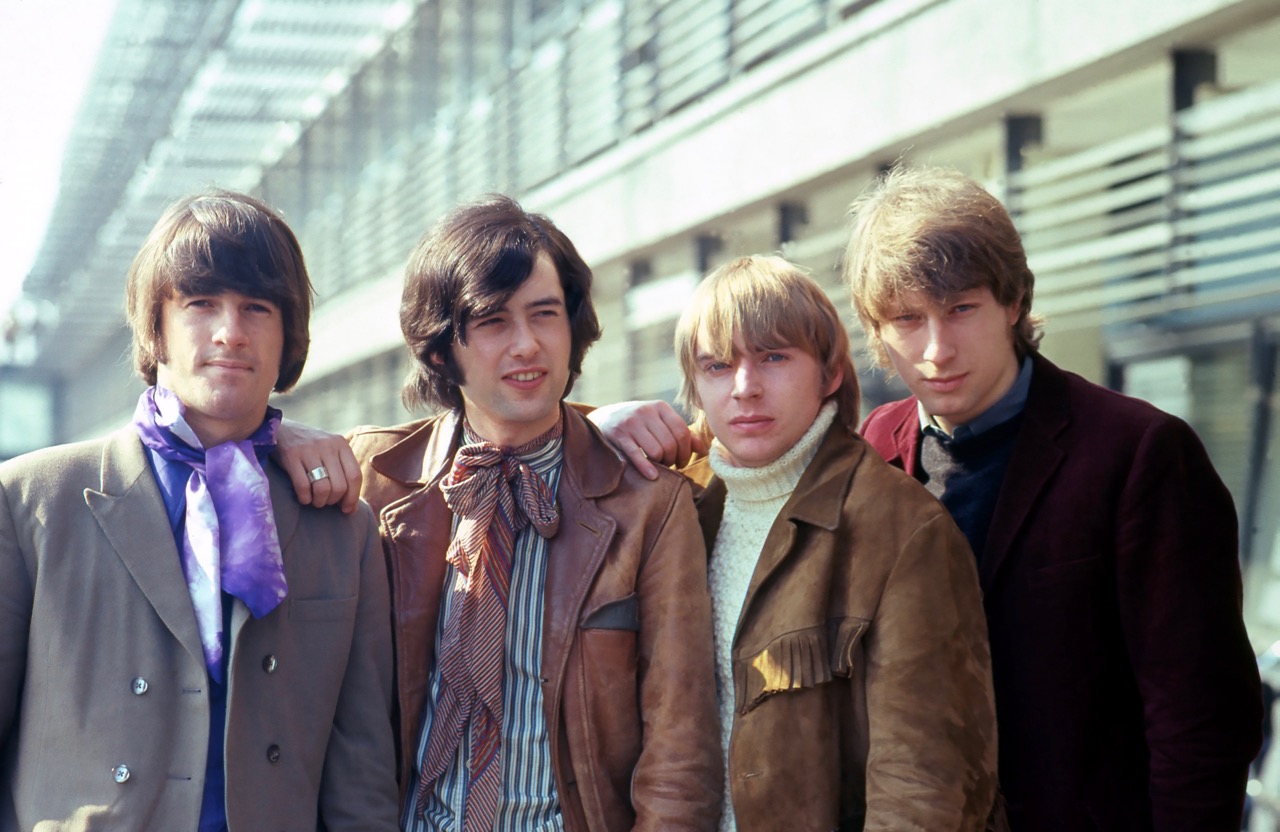
28 Jun LP’s MIA & Matador Playlist(s) 6/7/18 – 6/14/18
This missive is intended to address the myth and the mystery of three great albums of late ‘60s/early ‘70s rock n’ roll that have, to various degrees, disappeared from public circulation and from the collective sub- or un-conscious. None of them is completely gone—the original albums exist on the margins of the marketplace, on eBay and in the rarities bins of collector vinyl emporiums (emporia?) and some have been reborn in modern guise—but they remain largely obscure relics of special interest only to pathetic dorks such as Your Humble Narrator. Each one of these albums was important to me as a wee lad back home in New Orleans and I listened to each one of them countless times on my plastic close-and-carry record player back in the days before digital anything and Oranguntans-in-Chief. Ahhhh, thems was the days.
The recordings in question are ‘Live Yardbirds, featuring Jimmy Page’ by the Yardbirds, ‘Coast to Coast, Live: Overture and Beginners’ by Rod Stewart & Faces, and ‘Time Fades Away’ by Neil Young. All three of these recordings disappeared from the record stores not long after they were issued, largely due to the artists’ subsequent dissatisfaction with their quality. They languished in cut-out bins for a while, available for $1.99 or thereabouts before eventually vanishing altogether. In two of these three cases, those of the Yardbirds and Neil Young, only recently has the material been rehabilitated and reissued, nearly 50 years after the fact. As for Sir Roderick of Stewart, I suggest not bothering to hold your breath in anticipation of his following suit.
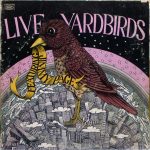 ‘Live Yardbirds featuring Jimmy Page’ was released in 1971 by the Columbia subsidiary Epic Records as a shameless attempt to cash in on the immediate success of Led Zeppelin. Page had formed Zeppelin in 1969 under the moniker the New Yardbirds when the original band disbanded before fulfilling various tour obligations in Scandinavia. The Yardbirds were an important group for a variety of reasons but they are primarily remembered for fostering the early careers of their lead guitarists who were, in order, Eric Clapton, Jeff Beck and Jimmy Page. The rest of the original lineup included singer/harmonicist Keith Relf, drummer Jim McCarty, Paul Samwell-Smith on bass, and rhythm guitarist Chris Dreja. Clapton was a Yardbird for about a year and a half but departed in early 1965, displeased over the band’s increasingly pop-ish orientation (the final straw being the harpsichord-driven hit ‘For Your Love’). Clapton went on to join John Mayall’s Bluesbreakers, but he recommended the young session guitarist Jimmy Page as his replacement. Page was reluctant to take up the touring lifestyle and to give up his lucrative studio work so he, in turn, recommended his friend Jeff Beck.
‘Live Yardbirds featuring Jimmy Page’ was released in 1971 by the Columbia subsidiary Epic Records as a shameless attempt to cash in on the immediate success of Led Zeppelin. Page had formed Zeppelin in 1969 under the moniker the New Yardbirds when the original band disbanded before fulfilling various tour obligations in Scandinavia. The Yardbirds were an important group for a variety of reasons but they are primarily remembered for fostering the early careers of their lead guitarists who were, in order, Eric Clapton, Jeff Beck and Jimmy Page. The rest of the original lineup included singer/harmonicist Keith Relf, drummer Jim McCarty, Paul Samwell-Smith on bass, and rhythm guitarist Chris Dreja. Clapton was a Yardbird for about a year and a half but departed in early 1965, displeased over the band’s increasingly pop-ish orientation (the final straw being the harpsichord-driven hit ‘For Your Love’). Clapton went on to join John Mayall’s Bluesbreakers, but he recommended the young session guitarist Jimmy Page as his replacement. Page was reluctant to take up the touring lifestyle and to give up his lucrative studio work so he, in turn, recommended his friend Jeff Beck.
Beck joined the group in March, 1965, and helped steer them in an increasingly psychedelic pop direction. Samwell-Smith left the band in the summer of 1966 to pursue a career in record production, prompting a realignment of the corps with Dreja shifting to bass. The Yardbirds drafted in Jimmy Page who temporarily took over bass duties while Dreja familiarized himself with the new instrument. Page and Beck then shared dual-lead guitar duties for a brief period until the temperamental Beck quit the group in late 1966.
With Page as the band’s sole guitarist the Yardbirds blazed on in the psych-pop vein with Page introducing elements of signature Zeppelin stage craft such as the violin bow segment during ‘Dazed and Confused’ (titled ‘I’m Confused’ and with slightly different lyrics on this release). Though no longer the Top of the Pops sensations they once were, the Yardbirds continued to tour the U.K., Europe and the U.S.. The album ‘Live Yardbirds, featuring Jimmy Page’ was recorded at the Anderson Theater on New York’s Lower East Side in March of 1968 during the band’s final American tour. It’s a wild document, especially in its original version: Since the audience was relatively small the suits back at Epic Records decided to beef things up by overdubbing it with cheers and applause from a bullfight recording (??). I remember as a kid wondering what antics might have been going on onstage when seemingly random cheering erupted in the middle of a chorus or whatever. Keith Relf’s stage banter was also a bit strange—at times he seems bitter and surly, resentful of Page’s rising prominence within the group. At the beginning of Page’s solo instrumental showcase ‘Black Summer’ Relf introduces the number and then mutters ‘I guess I’ll just, like, wander off and leave the stage to Jimmy Page.’
For some reason McCarty’s drums were recorded with one solitary overhead mic so there’s not a lot of sonic range there and an ill advised mid-tempo ballad (‘My Baby’ by Jerry Ragovoy) kind of saps the momentum halfway through the set. The playing is a bit slipshod at times and the rhythm section of Dreja and McCarty doesn’t exactly have a lot of swing. Keith Relf’s ptich is uncertain now and then but these are minor complaints. Somehow all of these elements add to the rather dark, anarchic energy of the proceedings and, most importantly, Page’s playing is equal to anything he committed to tape with Led Zeppelin. I’m telling you, Pagey is en fuego here, folks.
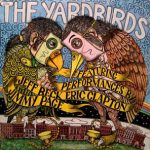 When ‘Live Yardbirds’ was released Page took issue and instigated legal proceedings to have the album withdrawn. Inventory already out on the market ended up in cut-out bins and that’s where I acquired my copy, at the Woolworth’s on Canal Street in New Orleans, probably in 1971 or ’72. I loved this record from the first listen and I still have my original copy. The cover artwork by James Grashow is fantastic (a companion to the artwork on a Yardbirds double elpee compilation released by Epic in 1970) and the essay on the back cover by future Patti Smith guitarist Lenny Kaye was great as well. I never really believed that Page was unhappy with his performance—his playing is nimble, expressive and explosively energetic—but I guess he resented the blatant cash-in aspect of the album, the iffy fidelity and the dubbed bullfight noise. It has always been my suspicion that Page felt that the rest of the band just wasn’t playing up to his level and if that was ever the case Page would have a point. The Yardbirds were undoubtedly a talented group but despite their legendary lead guitarists they simply weren’t on the level of Cream or Fleetwood Mac (early Brit/blues incarnation) or, eventually, Led Zeppelin. It seemed pretty obvious that the group was not a vessel sufficient to Page’s highly ambitious musical ambitions.
When ‘Live Yardbirds’ was released Page took issue and instigated legal proceedings to have the album withdrawn. Inventory already out on the market ended up in cut-out bins and that’s where I acquired my copy, at the Woolworth’s on Canal Street in New Orleans, probably in 1971 or ’72. I loved this record from the first listen and I still have my original copy. The cover artwork by James Grashow is fantastic (a companion to the artwork on a Yardbirds double elpee compilation released by Epic in 1970) and the essay on the back cover by future Patti Smith guitarist Lenny Kaye was great as well. I never really believed that Page was unhappy with his performance—his playing is nimble, expressive and explosively energetic—but I guess he resented the blatant cash-in aspect of the album, the iffy fidelity and the dubbed bullfight noise. It has always been my suspicion that Page felt that the rest of the band just wasn’t playing up to his level and if that was ever the case Page would have a point. The Yardbirds were undoubtedly a talented group but despite their legendary lead guitarists they simply weren’t on the level of Cream or Fleetwood Mac (early Brit/blues incarnation) or, eventually, Led Zeppelin. It seemed pretty obvious that the group was not a vessel sufficient to Page’s highly ambitious musical ambitions.
The upshot of all of this was that this recording disappeared from the public eye and ear for approximately 47 years until Jimmy Page purportedly came across a copy of the original masters in his personal archive. He removed the bullfight noise and Relf’s snarky asides, remixed and remastered the recording and released it in November of 2017 as ‘Yardbirds ’68’ on his own label. Surviving bandmates Dreja and McCarty added their blessings to the reissue (Keith Relf died tragically in an electrocution accident in 1976) and I snarfed up a copy the moment it hit the market. ‘Yardbirds ’68′ does indeed sound better than ever and it’s an essential document for any fan of the Yardbirds, Jimmy Page and/or Led Zeppelin.
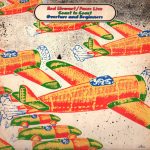 ‘Rod Stewart/Faces, Live: Coast to Coast, Overture and Beginners’ is an unusual document of an odd moment in the careers of its participants. Rod the Mod became a Face in May of 1969 after stints with Steampacket and Jeff Beck’s first post-Yardbirds project, the Jeff Beck Group, which also featured future Face Ron Wood on bass. Stewart had been signed to Mercury Records as a solo act and this set up a tension between his dual status as solo artiste and band member. Stewart’s solo fame took off in 1971 when his third album ‘Every Picture Tells A Story’ produced a major hit with a b-side toon titled ‘Maggie May.’
‘Rod Stewart/Faces, Live: Coast to Coast, Overture and Beginners’ is an unusual document of an odd moment in the careers of its participants. Rod the Mod became a Face in May of 1969 after stints with Steampacket and Jeff Beck’s first post-Yardbirds project, the Jeff Beck Group, which also featured future Face Ron Wood on bass. Stewart had been signed to Mercury Records as a solo act and this set up a tension between his dual status as solo artiste and band member. Stewart’s solo fame took off in 1971 when his third album ‘Every Picture Tells A Story’ produced a major hit with a b-side toon titled ‘Maggie May.’
By 1973, Stewart and the Faces were touring as co-billed acts—in other words, the Faces had more or less become his backing group and that didn’t sit particularly well. Original (Small) Faces members Kenney Jones (drums) and Ian McLagan (keyboards) had been augmented by Ron Wood on guitar replacing founding member Steve Marriott and Tetsu Yamauchi replacing original bassist Ronnie Lane. The Faces never recorded another studio album and the group broke up in late 1974 making ‘Coast to Coast’ essentially the band’s last gasp.
Despite the title, ’Coast to Coast’ was recorded on just one coast—the West one—in Anaheim and Hollywood in October ’73. In keeping with the shifting balance of power, six of the songs on the album are from Rod Stewart solo albums while three are from prior Faces releases, along with four covers: The Temptations’ hit ‘I Wish It Would Rain,’ the Etta James classic ‘I’d Rather Go Blind,’ ‘Angel’ by Jimi Hendrix, and John Lennon’s ‘Jealous Guy.’ There’s also a snippet of ‘Amazing Grace’ for that good churchifying vibe. Despite whatever simmering animosities there might have been in the group, the good timey boozy/bluesy vibe that one would expect from the Faces is fully present. Stewart is in good voice and Ron Wood’s guitar playing is loose but lively and rhythmically propulsive. McLagan’s boogie woogie piano and organ playing is excellent. As with the Yardbirds recording, if there’s anything hindering the proceedings it probably extends from the rhythm section being a bit sloppier than one might ideally wish. Ian McLagan later stated that it was a mistake to hire Tetsu for the band as he was not a good fit musically and was perhaps imbibing of recreational beverages rather too enthusiastically for the rest of the group, and for this lot that’s saying something. The album’s liner notes thank Pimm’s #1, Courvoisier, Teacher’s scotch, Coors and ‘vino’ as “these implements are the mainstay of our melodic frolics.” You can’t buy that kind of endorsement.
The second side of the album is probably one of my favorite sides of any live album ever. The versions of ‘I Wish It Would Rain,’ ‘I’d Rather Go Blind’ and ‘Jealous Guy’ are my all-time favorite takes on these songs and, considering the original artists that’s a bold claim. I know it’s a matter of taste, but the loose limbed playing on ‘I’d Rather Go Blind’ struck me then and now as especially heartfelt and soulful. Ron Wood was/is no Jimmy Page—he plays one note for every 50 that Page does on ‘Live Yardbirds’—but as a fledgling guitar player I got as much, if not more, out of his solo on ‘I’d Rather Go Blind’ than I did out of Page’s blazing away on something like ‘I’m Confused.’ The medley of ‘Borstal Boy/Amazing Grace’ is a gem and I don’t think that Ron Wood has ever surpassed his sensitive slide playing on the extended instrumental sections.
The album ends with ‘Jealous Guy’ and despite the many covers out there (Donny Hathaway, Roxy Music, Lou Reed, Joe Cocker, and even Peter Criss—yes, that Peter Criss, God help us all!) none of them can touch this version, IMHO. At the beginning of the song Stewart says ‘What we really came back to play is this number, Jealous Guy,’ and I’m very glad indeed that they did come back. Unlike Lennon, Stewart doesn’t sing the song in falsetto and his soulful rasp, particularly on the last chorus, is a wondrous thing to behold. He performs the whistling break quite nicely as well.
‘Coast to Coast, Overture and Beginners’ was not well regarded by the critics at the time of its release. This was the era of the big deal superstar live album and ‘Coast to Coast’ came right in the middle of it, preceded by the Rolling Stones ‘Get Your Ya Ya’s Out,’ The Who’s ‘Live at Leeds,’ Jimi Hendrix’s ‘Band of Gypsys,’ the Doors’ ‘Absolutely Live’—all released in 1970—and the Allman Brothers’ ‘At Fillmore East’ (1971). It was followed by Zeppelin’s ‘The Song Remains the Same’ and the mother of them all, ’Peter Frampton Comes Alive’ in 1976. In comparison, ‘Coast to Coast’ was a modest, unassuming effort. It comes off as casual, offhand even, and therein lies its charm. There’s no bombast, no grandstanding, no bullshit—just a boozy fun night out with the boys.
‘Coast to Coast’ executed a swift dive into the cut out bins and copies were available for $1.99 or thereabouts for years afterwards. Now the album is available solely on CD as a Japanese import, although original vinyl can still be found on eBay for anywhere from $5 to $100. The Faces were relegated to the pages of history soon afterwards and its membership dispersed to the four winds: Ron Wood was drafted into the Rolling Stones in 1975, Kenny Jones was conscripted into the Who in ’78, and Ian McLagan pursued a successful career in high-end session work. Rod the Mod—well, we all know what happened there. Rod put out a few more semi-respectable solo albums but by 1978 he was inquiring if we thought he was sexy and things have been steadily downhill ever since. ‘Rod Stewart/Faces, Live: Coast to Coast, Overture and Beginners’ exists as a bracing antidote to all of the tawdry unpleasantness that followed.
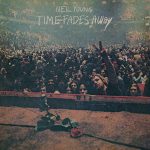 The final installment of this nostalgic exercise in pointlessness addresses perhaps the most enigmatic album of the bunch: Neil Young’s ‘Time Fades Away.’ ‘Time Fades Away’ was preceded by ’Harvest,’ the last of a trio of sulky country/hippie-rock masterpieces that began with ‘Everybody Knows This Is Nowhere’ in 1969 followed by ‘After the Gold Rush’ in 1970. These classic albums firmly established Young’s reputation as an important solo artiste in the post-Woodstock era, elevating his popularity above and beyond that of his cohorts Crosby, Stills and Nash. (‘Journey Through the Past’ was released in 1972 but it was an oddball soundtrack album cobbled together from television appearances, studio outtakes, live recordings with CSNY, and some random classical music. In fact, the song ‘Journey Through the Past’ doesn’t even appear on the album of the same name, but rather on ‘Time Fades Away.’)
The final installment of this nostalgic exercise in pointlessness addresses perhaps the most enigmatic album of the bunch: Neil Young’s ‘Time Fades Away.’ ‘Time Fades Away’ was preceded by ’Harvest,’ the last of a trio of sulky country/hippie-rock masterpieces that began with ‘Everybody Knows This Is Nowhere’ in 1969 followed by ‘After the Gold Rush’ in 1970. These classic albums firmly established Young’s reputation as an important solo artiste in the post-Woodstock era, elevating his popularity above and beyond that of his cohorts Crosby, Stills and Nash. (‘Journey Through the Past’ was released in 1972 but it was an oddball soundtrack album cobbled together from television appearances, studio outtakes, live recordings with CSNY, and some random classical music. In fact, the song ‘Journey Through the Past’ doesn’t even appear on the album of the same name, but rather on ‘Time Fades Away.’)
After a string of popular and critically acclaimed studio albums the expected move would be to release a live recording compiling a selection of toons from the preceding elpees, thereby buying time for the artist to produce new material to take back into the studio. But Brother Neil had other ideas. ‘Time Fades Away’ is a raucous collection of previously unreleased material that must have been a bit of a head scratcher for many fans as well as a questionable move in the estimation of the suits back at Neil’s record company, Reprise. It was simply not done to release new songs on a live record—a cover song or two, perhaps, but not new compositions—and a live album consisting exclusively of new material was simply unheard of.
Regardless, ‘Time Fades Away’ did relatively well, reaching #22 on the Billboard album charts and selling over a million copies in the U.S. and U.K.. This is probably more a measure of Young’s massive popularity at the time than anything else, which is not to say that the album isn’t good, just that it’s a bit… odd. If the playing on ‘Live Yardbirds’ and ‘Coast to Coast’ is a bit loose, it’s downright sloppy at times on ‘Time Fades Away,’ particularly on the title track. By all accounts the 62-date concert tour was pretty much of a miserable train wreck for all parties concerned.
Young’s friend and former Crazy Horse guitarist Danny Whitten was in a downward drug spiral and was dismissed from Young’s new backing band, the Stray Gators, just before the tour began. He died of an overdose the night after he was let go. Young’s friend and roadie Bruce Berry overdosed a few months later. Drummer Ken Buttrey demanded to be paid $100,000—over $500,000 in present-day frog pelts—for the tour which led the other musicians (all of whom had lucrative careers as studio guns) to demand the same. Pianist Jack Nitzsche was reportedly temperamental and abusive to his fellow musicians. Boozing and drugging were rampant. Young had equipment and vocal problems, pitched tantrums, cancelled rehearsals and discovered a serious affinity for tequila. The lineup of the band was in flux throughout the tour and no one seemed to be having much in the way of fun.
When the CD revolution roared into view in the mid-‘80s Young decided against reissuing the album on the new format. Young called the album “the worst record I ever made” and described it in unreleased liner notes for his compilation album ‘Decade’ thusly: “I released it anyway so you folks could see what could happen if you lose it for a while. I was becoming more interested in an audio verite approach than satisfying the public demands for a repetition of ‘Harvest.’” In that sense, Young certainly achieved his goal and ‘Time Fades Away’ stands as a testament to the warts-and-all approach to documenting the concert experience. I think that’s what intrigued me about this album as a kid—it was just so not what one would expect from Neil Young at that time and it reinforced the notion that you could be a successful and respected rock musician and not always have to sing and play perfectly. You could sing off key (now and then) and fluff a solo (here and there) and it could still be great rock and roll.
After the initial vinyl release ran its course this music remained unavailable until 2017 when Young finally allowed it to be released on CD. Digital downloads are now available via Apple iTunes and other platforms. ‘Times Fades Away’ holds up quite well indeed in my estimation and Young has gone on to release copious amounts of live material from various phases of his career. And if Neil still regards this as the worst album he ever made I would suggest he go back and have another listen to ‘Trans’ and ‘Landing on Water.’ But then Brother Neil was a fan of Ronald Reagan back in those days. And he’s Canadian as well—a nation of evil, lying backstabbers as we all now know! Well, nobody’s perfect.
And speaking of imperfection, here’s some Ye Olde Matador Lounge playlists.
Matador Playlist 6/7/18
Grammar of Life – Charles Bukowski
Talkin’ Bout the Smiling Deathporn Immortality Blues – Flaming Lips
Bummer in the Summer – Love
The Last Time – the Rolling Stones
Second and Dryades – Galactic
Out in the Streets – the Shangri-Las
The Sky Is A Landfill – Jeff Buckley
Public Image – Public Image Ltd.
Walking the Floor Over You – Ernest Tubb
Miserable Song – Gable
Gett Off – Prince & the New Power Generation
Reservoir – Division Day
Streams of Whiskey – the Pogues
The Night They Drove Old Dixie Down – the Band
Smokerings – Screaming Trees
All Down the Line – the Rolling Stones
A New England – Billy Bragg (singalong w/ Bro Cubbie)
Funkify Your Life – the Meters
Jolene – Dolly Parton
Lipstick Traces – Benny Spellman
St. Swithin’s Day – Billy Bragg (singalong w/ Bro Cubbie)
Animal – Anti-Nowhere League
Journey to the Center of Your Mind – Amboy Dukes
Baby, Let’s Go To Mexico – Sir Douglas Quintet
Corvette Bummer – Beck
Getting Older/Losing Touch – the Methadones
Honky Tonkin’ – Hank Williams
Pitbull Terrier – Die Antwoord
Love In A Void – Siouxsie & the Banshees
Crescent City – Lucinda Williams
You Say You Don’t Love Me – Buzzcocks
Papa Don’t Take No Mess, Pt. 1 – James Brown
No Depression in Heaven – Sheryl Crow
If You Want Me to Stay – Sly & the Family Stone
Negative Capability – the Shimmies
The Revolution Will Not Be Televised – Gil Scott-Heron
I Believe In Evil – Screaming Females
Lonely Weekends – Charlie Rich
Get With It – Charlie Feathers
I Got Loaded – Lil’ Bob & the Lollipops
Sing A Simple Song – Sly & the Family Stone
Sweet Surrender – Sarah McLachlan
Baby, I Love You – Aretha Franklin
Power to the People – Public Enemy
Gone, Gone, Gone – the Shods
Fear, Hate, Envy, Jealousy – the Neville Brothers
Fifteen Feet of Pure White Snow – Nick Cave & the Bad Seeds
Rumble – the Sonics
Over the Ocean (’91 Dance Party Mix)- Low
Son of a Preacher Man – Bobbie Gentry
Gene and Eddie – the Stray Cats
No Reply – the Beatles
Jesus Christ Pose – Soundgarden
Voodoo Cadillac – Southern Culture on the Skids
Red Hen Hop – Louvin Brothers
Union Square – Tom Waits
If I Can’t Change Your Mind – Sugar
8th and Alvarado – Die Nasty
Lost Highway – Chris Hillman
The Wild Side of Life – Hank Thompson & His Brazos Valley Boys
World Without Tears – Lucinda Williams
Buona Sera – Louis Prima
Happy Trails – Roy Rogers & Dale Evans (feat. Trigger on G7 Blues)
Taxi – Bryan Ferry
Matador Playlist 6/14/18
Grammar of Life – Charles Bukowski
Dead in the Saddle – Dead Moon
Hot Fun in the Summertime – Sly & the Family Stone
Someone Else’s Heart – Elvis Costello
Train Kept A Rollin’ – the Yardbirds
It’s A Long Way to the Top (If You Wanna Rock n’ Roll) – AC/DC
Cry – the Birthday Party
Beware, Brother, Beware – Louis Jordan and his Tympany Five
Davey Crockett – the Traditional Fools
Bloodhounds on my Trail – the Black Angels
Nicotine Fit – Voodoo Glow Skulls
Fried Chicken and Gasoline – Southern Culture on the Skids
P.Y.T. (Pretty Young Thing) – Michael Jackson
I Cut Like A Buffalo – the Dead Weather
The Crunge – Led Zeppelin
Kill Surf City – the Jesus & Mary Chain
I Got the Feeling – James Brown
Louisiana Woman, Mississippi Man – Loretta Lynn & Conway Twitty
Future Starts Slow – the Kills
You’ve Got Another Thing Comin’ – Judas Priest
Kawasaki Z117 50 Rock n’ Roll – the Jon Spencer Blues Explosion
Girlfriend in a Coma – the Smiths
I Washed My Hands in Muddy Water – Charlie Rich
Soul City – Southern Culture on the Skids
Vampires (feat. Femi Kuti) – Thievery Corporation
Bubbles in My Beer – Bob Wills & His Texas Playboys
The Weeping Song – Nick Cave & the Bad Seeds
Sideways Eight – Echo & the Bunnymen
Little Cream Soda – the White Stripes
Between the Wars – Billy Bragg (singalong w/ Cubbie & Bobby)
Mule Skinner Blues – Roy Acuff
Undercover of the Night – the Rolling Stones
Never Listen to Me – the Thermals
What A Crying Shame – the Mavericks
Jesus Meets the Stupids – the Stupids
I Fall to Pieces – Patsy Cline
Oh Bondage! Up Yours! – X-Ray Spex
Just Can’t Get Enough – Depeche Mode
Never Let Me Down Again – Depeche Mode
Good Times, Bad Times – Led Zeppelin
Night of the Living Baseheads – Public Enemy
This Charming Man – the Smiths
Stone Free – Jimi Hendrix Experience
Seven Nation Army – the White Stripes
Communication Breakdown – Led Zeppelin
Please Please Please Let Me Get What I Want – the Smiths
Sweet Home Alabama – Lynyrd Skynyrd
Tall Man, Skinny Woman – Ty Segall
Honky Tonk Women – the Rolling Stones
You Shook Me All Night Long – AC/DC
(Sittin’ On) The Dock of the Bay – Otis Redding
Little Hands – Skip Spence
World Without Tears – Lucinda Williams
Buona Sera – Louis Prima
Happy Trails – Roy Rogers & Dale Evans (feat. Trigger on Detained Bordertronics)
Taxi – Bryan Ferry
